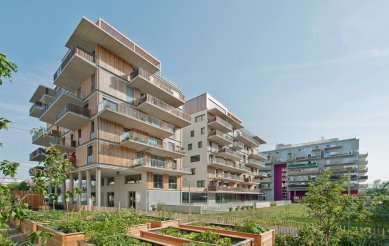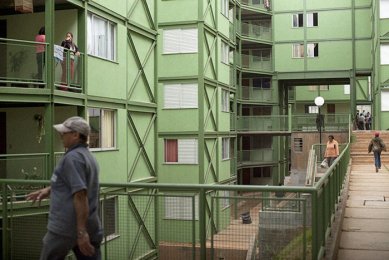
Bydlet spolu? - invitation to a discussion at Gallery VI PER
The idea of collective houses emerged at the end of the 19th century. It was housing for the wealthy who did not want to keep servants. In the 1920s, avant-garde architects introduced the idea that rationally designed houses for hundreds of inhabitants could solve the housing crisis of the time. In collective houses, an individual or family had a small private space complemented by shared facilities such as dining rooms, laundries, nurseries, community rooms, and sports facilities. In our country, two experimental houses were realized after World War II, in Zlín and Litvínov.
The discussion will present an update on the concept of collective housing and its benefits, which include not only economic savings but also personal experience in close non-family living, mutual support among community members, reduction of ecological footprints, and social emancipation. The event is held in connection with the publication of the book Living Together: Collective Houses in the Czech Lands and Europe in the 20th Century (ed. Hubert Guzik, Prague: Arbor Vitae 2017), which presents the phenomenon of collective houses in a historical perspective.
Guests:
Jan Blažek is an economist and social geographer working at the Department of Environmental Studies at Masaryk University in Brno. In his dissertation research, he focuses on residential socio-ecological community projects. He primarily examines models of economic organization of collective housing and also addresses alternative financing of construction and the interconnection of environmental, economic, and social sustainability of these structures. He has personally visited and included more than forty projects in six European countries in his research. During his research, he collaborated with, for example, UAB Barcelona and the University of Sheffield. In addition to community economics, he also focuses on the concept of commons, alternative currencies, and sustainable business.
Karolína Vránková is a journalist. Since 2007 she has worked as an editor at the weekly Respekt. She also writes for other printed media and hosts the show Degustation of Design on Radio 1 together with Adam Štěch. She deals with architecture, design, and lifestyle. She academically explores the topic of shared housing, especially from a sociological perspective. She studied media studies at Charles University and completed work and study stays in Amsterdam, Newcastle, and Berlin.
Lenka Kužvartová is an architectural historian and a PhD candidate at the Institute of Art History at Charles University in Prague. She has been long-term engaged in collective housing and the socially engaged role of the architect. She co-authored the exhibition project Living Together: Czech Collective Houses, which included exhibitions from 2017 to 2018 at the Museum of Art in Olomouc, the Regional Gallery in Liberec, and the Alšova South Bohemian Gallery – Gallery Mariánská in České Budějovice. For this project and the subsequent publication Living Together: Collective Houses in the Czech Lands and Europe in the 20th Century, she conducted research on so-called hotel-type houses. As part of her dissertation, she examines the work of Brazilian and Portuguese radical architects.
Barbora Vacková is a sociologist and educator working at the Department of Media Studies and Journalism at the Faculty of Social Studies and the Department of Civic Education at the Faculty of Education at Masaryk University. She primarily focuses on urban sociology and the sociology of housing. She is the author or co-author of several scholarly articles and several books, including The Baťa House: Disappearing Elements of Zlín Architecture (2017), Alone at Home: Housing, Work, and Relationships of People Living in Single-Person Households (2014), Third City (2011), and Space, Power, and Utopia: The Ideal City and Its Society (2010).
The Faculty of Architecture at ČVUT co-hosts the event.
More information >
The discussion will present an update on the concept of collective housing and its benefits, which include not only economic savings but also personal experience in close non-family living, mutual support among community members, reduction of ecological footprints, and social emancipation. The event is held in connection with the publication of the book Living Together: Collective Houses in the Czech Lands and Europe in the 20th Century (ed. Hubert Guzik, Prague: Arbor Vitae 2017), which presents the phenomenon of collective houses in a historical perspective.
Guests:
Jan Blažek is an economist and social geographer working at the Department of Environmental Studies at Masaryk University in Brno. In his dissertation research, he focuses on residential socio-ecological community projects. He primarily examines models of economic organization of collective housing and also addresses alternative financing of construction and the interconnection of environmental, economic, and social sustainability of these structures. He has personally visited and included more than forty projects in six European countries in his research. During his research, he collaborated with, for example, UAB Barcelona and the University of Sheffield. In addition to community economics, he also focuses on the concept of commons, alternative currencies, and sustainable business.
Karolína Vránková is a journalist. Since 2007 she has worked as an editor at the weekly Respekt. She also writes for other printed media and hosts the show Degustation of Design on Radio 1 together with Adam Štěch. She deals with architecture, design, and lifestyle. She academically explores the topic of shared housing, especially from a sociological perspective. She studied media studies at Charles University and completed work and study stays in Amsterdam, Newcastle, and Berlin.
Lenka Kužvartová is an architectural historian and a PhD candidate at the Institute of Art History at Charles University in Prague. She has been long-term engaged in collective housing and the socially engaged role of the architect. She co-authored the exhibition project Living Together: Czech Collective Houses, which included exhibitions from 2017 to 2018 at the Museum of Art in Olomouc, the Regional Gallery in Liberec, and the Alšova South Bohemian Gallery – Gallery Mariánská in České Budějovice. For this project and the subsequent publication Living Together: Collective Houses in the Czech Lands and Europe in the 20th Century, she conducted research on so-called hotel-type houses. As part of her dissertation, she examines the work of Brazilian and Portuguese radical architects.
Barbora Vacková is a sociologist and educator working at the Department of Media Studies and Journalism at the Faculty of Social Studies and the Department of Civic Education at the Faculty of Education at Masaryk University. She primarily focuses on urban sociology and the sociology of housing. She is the author or co-author of several scholarly articles and several books, including The Baťa House: Disappearing Elements of Zlín Architecture (2017), Alone at Home: Housing, Work, and Relationships of People Living in Single-Person Households (2014), Third City (2011), and Space, Power, and Utopia: The Ideal City and Its Society (2010).
The Faculty of Architecture at ČVUT co-hosts the event.
More information >
The English translation is powered by AI tool. Switch to Czech to view the original text source.


0 comments
add comment











